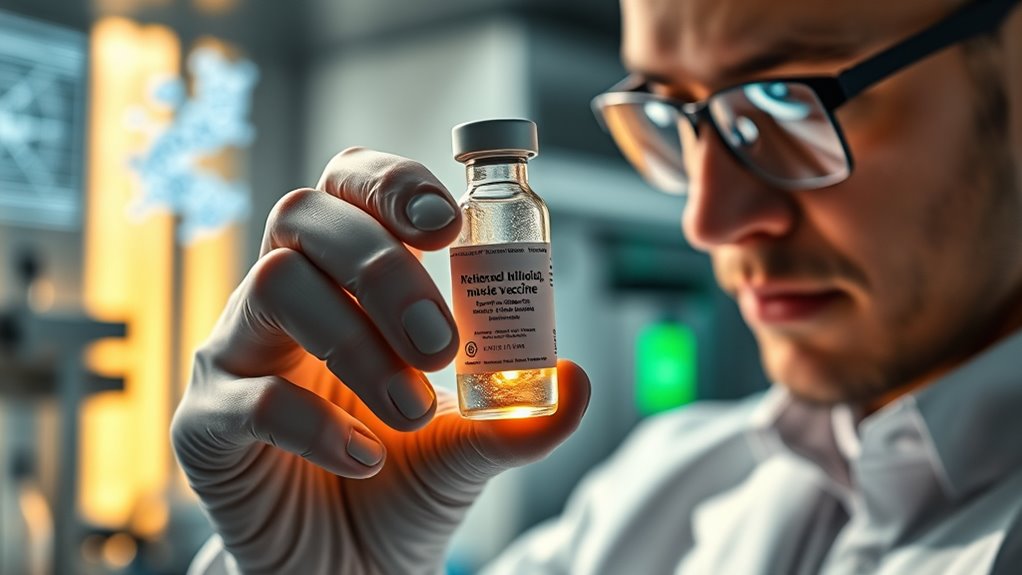Personalized mRNA vaccines can markedly lower melanoma relapse rates by tailoring immune responses to each patient’s unique genetic profile. These vaccines target specific tumor mutations, boosting the body’s ability to fight residual cancer cells. Recent clinical trials show they outperformed traditional approaches, providing stronger, longer-lasting immunity. This innovative strategy marks a breakthrough in cancer therapy that’s changing the way we approach personalized treatment—continue exploring to discover how this advancement could impact your care.
Key Takeaways
- Personalized mRNA vaccines target individual tumor mutations, enhancing immune response against melanoma cells.
- Clinical trial data show a significant reduction in melanoma relapse rates with personalized vaccines.
- Genetic profiling of tumors enables precise customization, improving vaccine efficacy and durability.
- The trial demonstrates that personalized mRNA vaccines outperform traditional approaches in preventing relapse.
- Advances in genomic sequencing facilitate rapid development of tailored vaccines, advancing personalized cancer therapy.

Personalized mRNA vaccines represent a groundbreaking approach to cancer treatment and infectious disease prevention by tailoring immune responses to an individual’s unique genetic profile. This innovative strategy harnesses the body’s immune system, training it to recognize and attack melanoma cells specifically. In a recent pivotal trial, researchers demonstrated that such personalized vaccines markedly reduce melanoma relapse rates, offering hope for improved long-term outcomes. As you follow this development, it’s clear that the key lies in the vaccine’s ability to boost vaccine efficacy by engaging the immune response more precisely than traditional therapies.
With personalized mRNA vaccines, you’re not relying on a one-size-fits-all approach. Instead, the vaccine is customized based on the genetic mutations present in an individual’s tumor. This customization enhances the immune response because the immune system becomes better equipped to identify and destroy melanoma cells that harbor those specific mutations. The trial results show that this targeted approach results in a more robust and durable immune response, which directly correlates with a lower chance of relapse. The stronger the immune response, the more effectively your body can keep residual cancer cells in check, preventing recurrence.
Personalized mRNA vaccines boost immune response by targeting individual tumor mutations, reducing relapse risk and improving long-term outcomes.
Moreover, the ability to tailor vaccines to an individual’s tumor profile increases the likelihood of achieving high vaccine efficacy. The personalized nature ensures that each vaccine is optimized to stimulate the immune system in the most effective way for that person. This contrasts with traditional vaccines or treatments that may not account for genetic differences between patients, often leading to variable outcomes. When you participate in or follow the progress of this research, it becomes evident that personalized mRNA vaccines could redefine standards of care by providing a more predictable and effective immune response. Additionally, understanding the genetic profile of tumors is crucial for maximizing the benefits of personalized therapies. Advances in genomic sequencing are making it easier to identify these mutations quickly and accurately. Furthermore, ongoing research highlights the importance of immune system engagement to achieve durable responses.
The trial’s success underscores the potential of mRNA technology to revolutionize cancer therapy. By focusing on the immune response, these vaccines not only aim to prevent relapse but also set a new benchmark for precision medicine. For patients, this means a future where treatments are tailored, more effective, and less burdensome. Moreover, the development of personalized vaccine strategies signifies a shift toward more individualized approaches in oncology. For researchers and clinicians, it confirms that harnessing the immune system through personalized vaccines is a promising path toward durable remission in melanoma. Overall, this advancement marks a noteworthy step forward in leveraging the power of personalized medicine to improve vaccine efficacy and patient outcomes in oncology.
Additionally, ongoing research emphasizes the importance of understanding individual genetic profiles to maximize treatment success personalized medicine.
Frequently Asked Questions
How Long Does It Take to Develop a Personalized Mrna Vaccine?
When you ask about developing a personalized mRNA vaccine, you’re looking at a process that typically takes several weeks. The vaccine development involves identifying specific tumor mutations, designing the mRNA, and then moving into manufacturing. The manufacturing timeline can be relatively quick compared to traditional methods, often around 2 to 4 weeks. Overall, from start to finish, it usually takes about 4 to 8 weeks to create a personalized mRNA vaccine tailored to your needs.
What Are the Potential Side Effects of the Vaccine?
You might worry about vaccine side effects, but most people experience only mild immune reactions, like soreness at the injection site or fatigue. Serious adverse effects are rare, and the benefits often outweigh the risks. The vaccine stimulates your immune system, which may cause temporary symptoms, but it’s designed to be safe. Always discuss any concerns with your healthcare provider to guarantee personalized safety and peace of mind.
Can This Vaccine Be Used for Other Cancers Besides Melanoma?
You’re wondering if this vaccine can target other cancers besides melanoma. The vaccine’s versatility suggests it could have broader applications, as mRNA technology can be customized to different tumor types. Researchers are exploring this potential, aiming to develop personalized vaccines for various cancers. While promising, each application requires rigorous testing to guarantee safety and effectiveness, so it’s not yet a standard treatment for cancers beyond melanoma.
What Is the Cost and Availability of the Personalized Vaccine?
Oh, the price of progress! You’ll find that personalized mRNA vaccines are currently quite costly, with a price tag that surpasses your average flu shot. Cost comparison shows they’re more expensive than traditional therapies, and insurance coverage varies widely. While some providers may cover parts of the cost, don’t hold your breath for universal coverage. Availability is limited, mostly reserved for clinical trials, so don’t expect a quick, budget-friendly solution just yet.
How Does This Vaccine Compare to Existing Melanoma Treatments?
You’ll find that this personalized mRNA vaccine offers a targeted approach, potentially reducing relapse rates more effectively than traditional treatments. When compared to immunotherapy combinations, it leverages genetic profiling to customize the immune response specifically for you. This personalized method may enhance effectiveness and minimize side effects, providing a promising alternative or complement to existing melanoma treatments, especially for patients seeking more tailored and precise options.
Conclusion
This breakthrough shows personalized mRNA vaccines can considerably reduce melanoma relapse, offering hope for patients. Some might worry about the complexity or cost, but as technology advances, these vaccines are becoming more accessible and easier to produce. By embracing this innovative approach, you’re not just fighting cancer—you’re taking control of your health with cutting-edge science. Stay hopeful, because this is just the beginning of personalized medicine transforming lives.









